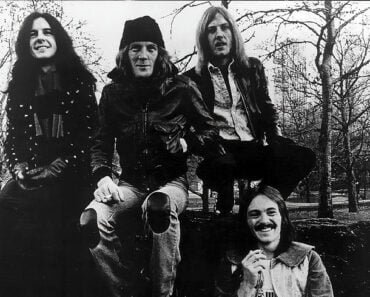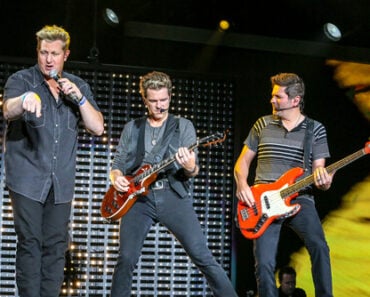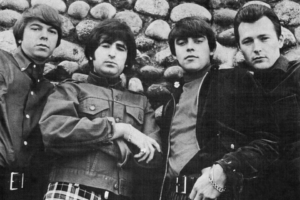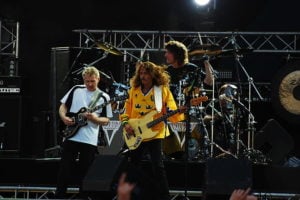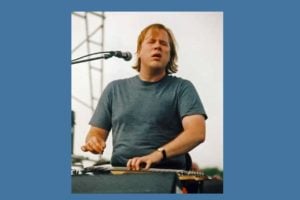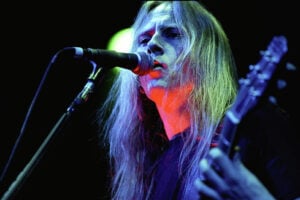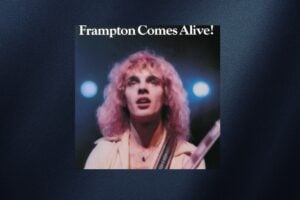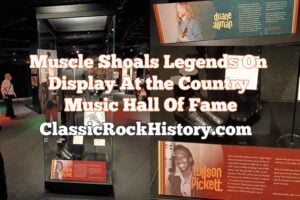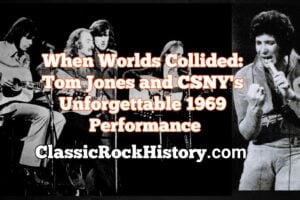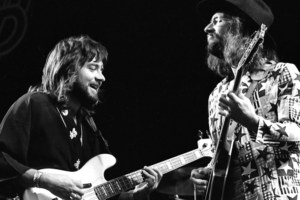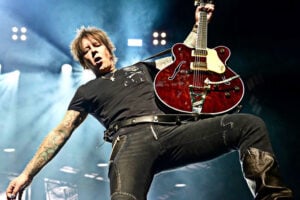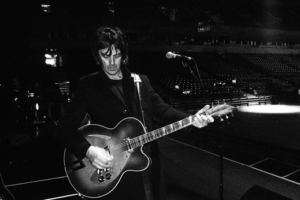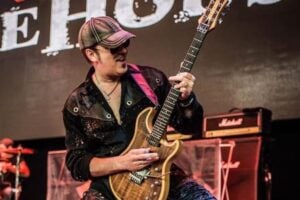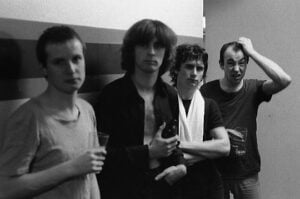
Feature Photo: Jean-Luc Ourlin, CC BY-SA 2.0 <https://creativecommons.org/licenses/by-sa/2.0>, via Wikimedia Commons
XTC began as Star Park in 1972, evolved through various incarnations including the Helium Kidz, and finally settled on their iconic name in 1975, derived from Jimmy Durante’s exclamation upon discovering the lost chord. The band released 12 studio albums between 1978 and 2000, achieving their highest UK chart positions with English Settlement reaching number 5 and the single “Senses Working Overtime” hitting number 10 in 1982. Despite critical acclaim and a devoted cult following, XTC ceased touring in 1982 following Andy Partridge’s stage fright breakdown, becoming a studio-only entity for the remainder of their career until disbanding in 2006.
XTC’s personnel changed significantly over their three-decade existence, with the core duo of Andy Partridge and Colin Moulding remaining constant throughout. The band went through various lineups during their early years as Star Park and the Helium Kidz, before settling into their classic formation with Terry Chambers on drums and Barry Andrews on keyboards for their first two albums. When Andrews departed in 1978, Dave Gregory joined as guitarist and later keyboardist, completing what many consider XTC’s definitive lineup that lasted through their commercial peak. After Chambers left in 1982, the remaining trio continued until Gregory’s departure in 1998, leaving Partridge and Moulding to complete the band’s final two albums as a duo.
The band’s evolution from punk-influenced new wave to sophisticated pop arrangements reflected both their musical growth and the changing personnel, with each member bringing distinct contributions that shaped XTC’s sound. Their influence extended far beyond their commercial success, with many citing them as pioneers of intelligent pop music that balanced accessibility with innovation. Despite never achieving massive commercial success, XTC’s 15 studio albums, including their Dukes of Stratosphear side project, established them as one of the most consistent and creative bands of their era.
Andy Partridge
Andy Partridge served as XTC’s primary songwriter, vocalist, and guitarist from the band’s formation in 1972 until their dissolution in 2006. Born in Valletta, Malta, in 1953, Partridge moved to Swindon as a child and formed his first band, Stiff Beach, in 1970 before evolving through various group names including Star Park and the Helium Kidz. As XTC’s frontman and de facto leader, Partridge wrote the majority of their songs and handled most interviews, while also designing many of their album covers due to his disappointment with early artwork provided by Virgin Records.
Partridge appeared on every XTC album from White Music (1978) through Wasp Star (2000), contributing guitar, vocals, and primary songwriting duties. His compositions ranged from the angular punk-pop of early songs like “Science Friction” to the pastoral sophistication of later works such as “Dear God” and “Easter Theatre.” He also created The Dukes of Stratosphear, XTC’s psychedelic alter ego, which allowed him to explore 1960s influences on albums like 25 O’Clock (1985) and Psonic Psunspot (1987). Partridge’s stage fright, which culminated in a breakdown during a 1982 Paris concert, led to XTC’s retirement from live performance and their transformation into a studio-only band.
Beyond XTC, Partridge has remained active as a solo artist and collaborator, working with artists including Robyn Hitchcock, Sarah McLachlan, and former XTC keyboardist Barry Andrews on the album Monstrance (2007). He has also pursued visual art and continues to release solo material and demos. Despite XTC’s official end in 2006, Partridge has periodically expressed interest in reuniting with Colin Moulding, though no concrete plans have materialized.
Colin Moulding
Colin Moulding, XTC’s bassist and secondary songwriter, joined Andy Partridge in 1972 and remained with the band through their entire existence until 2006. Born in Swindon in 1955, Moulding contributed some of XTC’s most memorable songs including “Making Plans for Nigel,” “Life Begins at the Hop,” and “Grass.” His bass playing provided the rhythmic foundation for XTC’s complex arrangements, while his songwriting offered a different perspective from Partridge’s more satirical approach, often focusing on personal relationships and everyday observations.
Moulding performed on every XTC album from White Music through Wasp Star, with his compositions becoming increasingly prominent as the band evolved. His song “Making Plans for Nigel” from Drums and Wires (1979) became XTC’s first major hit, reaching number 17 in the UK. Other notable Moulding compositions include “Generals and Majors” from Black Sea (1980), “Big Day” from Skylarking (1986), and “The Mayor of Simpleton” from Oranges & Lemons (1989). His bass style evolved from the driving punk rhythms of early albums to more sophisticated melodic lines that complemented the band’s increasingly complex arrangements.
After XTC’s dissolution, Moulding initially remained relatively quiet musically before collaborating with former drummer Terry Chambers on the project TC&I in 2017. They released the EP Great Aspirations and performed six shows in Swindon before Moulding ended the project in 2018. Since then, he has largely stepped away from the music industry, though he has occasionally expressed openness to working with Partridge again under the right circumstances.
Terry Chambers
Terry Chambers powered XTC as their drummer from the band’s formation in 1972 until his departure in 1982, appearing on albums from White Music through most of Mummer. Born in Swindon in 1955, Chambers originally wanted to learn piano but couldn’t afford one, so he saved money from his Saturday job to buy his first drum kit at age 14. His distinctive drumming style, featuring prominent tom work and creative rhythmic patterns, became integral to XTC’s sound during their most commercially successful period.
Chambers played on XTC’s breakthrough albums including Drums and Wires (1979), Black Sea (1980), and English Settlement (1982), with his drumming particularly notable on hits like “Making Plans for Nigel” and “Senses Working Overtime.” His pattern on “Making Plans for Nigel” was specifically designed to invert drum tones and accents in the style of Devo’s cover of “Satisfaction.” However, when XTC stopped touring following Partridge’s breakdown in 1982, Chambers became increasingly unhappy with the band’s direction, particularly their move toward more subdued, acoustic-oriented material on Mummer.
After leaving XTC mid-session during the Mummer recordings, Chambers emigrated to Australia where he joined the band Dragon between 1983 and 1985, appearing on their album Body and the Beat (1984) and live release Live One (1985). He remained in Australia for over 30 years, largely stepping away from the music industry except for session work. In 2016, he returned to the UK and collaborated with Colin Moulding on the TC&I project before forming EXTC in 2019, a band dedicated to performing classic XTC songs live, with Andy Partridge’s blessing and assistance in naming the group.
Barry Andrews
Barry Andrews served as XTC’s keyboardist and secondary vocalist from 1976 to 1978, appearing on their first two albums White Music and Go 2. Born in West Norwood, London, in 1956, Andrews moved to Swindon at age seven and joined XTC after responding to an advertisement placed by Andy Partridge. His avant-garde keyboard approach, initially reminiscent of Deep Purple’s Jon Lord, evolved into something more experimental and unconventional after Partridge encouraged him to develop his own style, resulting in what Partridge described as playing “like if Miró had played electric organ.”
Andrews’ keyboards were crucial to XTC’s early sound, providing the atmospheric textures that complemented their angular punk-pop arrangements. On White Music (1978), his playing ranged from conventional organ parts to more experimental soundscapes, while Go 2 (1978) showcased his increasing confidence with synthesizers and electronic effects. However, creative tensions arose during the Go 2 sessions when Andrews brought several original songs that Partridge felt weren’t suitable for XTC, leading to most of Andrews’ compositions being dropped from the album.
After leaving XTC in 1978, Andrews worked briefly with Robert Fripp’s League of Gentlemen before co-founding Shriekback in 1981 with former Gang of Four bassist Dave Allen. Shriekback became his primary musical outlet, releasing over a dozen albums and exploring industrial, funk, and experimental rock territories. Andrews also collaborated with major artists including Iggy Pop on the album Soldier (1980) and Brian Eno on Another Day on Earth (2005). In 2007, he reunited with Andy Partridge for the collaborative album Monstrance, demonstrating that their creative differences had been resolved over time.
Dave Gregory
Dave Gregory joined XTC as guitarist in 1979 and remained with the band until 1998, participating in their most critically acclaimed period including albums like Drums and Wires, Black Sea, English Settlement, and Skylarking. Born in Swindon in 1952, Gregory had previously played in local bands including Gogmagog and Dean Gabber and His Gaberdines before being recruited to replace Barry Andrews, though initially as a guitarist rather than a keyboardist. Partridge famously held a “pretend audition” where Gregory demonstrated his musicianship by asking whether they wanted the album or single version of “This Is Pop.”
Gregory’s guitar work became essential to XTC’s evolution from punk-influenced new wave to sophisticated pop arrangements. His 12-string Rickenbacker playing on English Settlement (1982) and string arrangements on Skylarking (1986) helped define XTC’s mature sound. He also gradually took over keyboard duties from Andrews’ departure, contributing piano, synthesizers, and orchestral arrangements that added depth to the band’s recordings. Notable Gregory contributions include his guitar solo on “Dear God,” his string arrangements throughout Skylarking, and his tasteful fills on songs like “Senses Working Overtime.”
Since leaving XTC during the early sessions for Apple Venus Volume 1 (1999), Gregory has maintained an active career as a session musician, working with artists including Peter Gabriel, Aimee Mann, Marc Almond, and Porcupine Tree. He joined progressive rock band Big Big Train in 2009 and was a member of Tin Spirits from 2008 to 2018, releasing the critically acclaimed album Wired to Earth (2011). Gregory has also contributed to various tribute projects and continues to be in demand for his guitar and keyboard skills, while maintaining his association with the XTC legacy through occasional interviews and fan interactions.
Dave Cartner
Dave Cartner served as guitarist for XTC’s predecessors Star Park and the Helium Kidz from 1972 to 1974, making him one of the earliest members of what would eventually become XTC. During his tenure with these early incarnations, Cartner helped establish the foundation of the band’s sound as they evolved from their initial formations into a more focused group. He performed alongside Andy Partridge, Colin Moulding, and Terry Chambers during this formative period when the band was still developing their identity and musical direction.
Cartner’s time with the group coincided with their evolution from the more basic rock approach of Star Park into the glam rock styling of the Helium Kidz. During this period, the band was beginning to incorporate the quirky elements that would later define XTC’s sound, though they had not yet reached the sophisticated arrangements and wordplay that would characterize their Virgin Records era. NME published a small profile of the band during Cartner’s time, noting their aspiration to achieve rock star status.
After leaving the group in 1974, Cartner stepped away from music as the remaining members continued to develop what would become XTC. His departure coincided with other lineup changes, including the eventual addition of Steve Hutchins as vocalist and later Jon Perkins on keyboards. While Cartner’s specific contributions to recordings from this era are not well-documented, his role as an early guitarist helped establish the foundation upon which XTC would build their later success.
Steve Hutchins
Steve Hutchins served as vocalist for the Helium Kidz from 1974 to 1975, before Andy Partridge took over lead vocal duties and the band transformed into XTC. A London-based semi-professional musician, Hutchins was recruited based on a recommendation from one of Partridge’s girlfriends who had heard him singing while cleaning windows. The band hoped his experience would help them secure a recording contract during their early development phase.
Despite his vocal abilities, Hutchins became known for his controversial stage behavior, particularly his habit of unzipping his boilersuit during performances to reveal his pubic hair. He believed this provocative act would attract both female fans and record company scouts to the band, but instead it created image problems that ultimately led to his dismissal. His theatrical approach conflicted with the band’s evolving vision and their desire to be taken seriously as musicians rather than shock performers.
Hutchins was dismissed from the band in June 1976, paving the way for Andy Partridge to assume lead vocal duties and for the group to finalize their transformation into XTC. His departure marked a crucial turning point in the band’s development, as it allowed them to focus on their musical evolution without the distraction of controversial stage antics. After leaving the Helium Kidz, Hutchins did not pursue any notable musical career, and his brief time with the group represents a footnote in XTC’s early history.
Jon Perkins
Jon Perkins served as keyboardist for XTC from 1975 to 1976, bridging the gap between the Helium Kidz era and the band’s signing to Virgin Records. Born in 1957, Perkins joined the group as they were transitioning from their glam rock phase into the more focused pop approach that would define their later career. He participated in the crucial period when the band was developing their sound and seeking a recording contract, contributing to early demo recordings that would eventually help secure their deal with Virgin.
Perkins played keyboards during XTC’s final transformation from the Helium Kidz into their permanent identity, participating in the sessions when they recorded early versions of songs that would appear on their debut album. His keyboard style contributed to the band’s evolving sound as they moved away from straight rock into the more experimental territory that would characterize their Virgin Records releases. However, creative differences with Andy Partridge led to his departure in 1976, just before the band achieved their breakthrough.
After leaving XTC, Perkins worked with other bands including Stadium Dogs and The Original Mirrors, though he never achieved the same level of recognition as his former bandmates. His departure opened the door for Barry Andrews to join the group and contribute to their first two albums. Tragically, Perkins died in April 2024 at the age of 66, with his passing officially announced by the band as recognition of his role in their early development.
Nervous Steve
Nervous Steve briefly served as bassist for one of XTC’s earliest incarnations in 1972, during the very beginning of what would eventually become the band’s formation. His tenure was extremely short-lived, lasting only during the initial experimental phase when Andy Partridge was assembling musicians for his early projects. Steve’s nickname “Nervous” likely reflected either his playing style or personality, though specific details about his contributions are scarce due to the brief nature of his involvement.
During Steve’s time with the group, they were still operating under different names and had not yet established the stable lineup that would carry them forward. This period predated even the Star Park era and represented the very earliest attempts to form what would become XTC. His role as bassist was quickly filled by Colin Moulding, who proved to be a much more compatible and long-term fit for Partridge’s musical vision.
After his departure in 1972, Nervous Steve did not continue with any notable musical career related to XTC or their later success. His brief involvement represents one of the many early lineup experiments that occurred before the band found their core identity with Partridge, Moulding, and Chambers forming the stable foundation that would persist throughout XTC’s career.
Paul Wilson
Paul Wilson served as drummer for XTC’s earliest incarnation in 1972, during the experimental phase before Terry Chambers joined the group. His involvement came during the very beginning of Andy Partridge’s efforts to assemble a stable band lineup, representing one of the many short-term personnel changes that occurred before XTC found their permanent core members. Wilson’s drumming tenure was brief, lasting only during the initial formation period when the band was still seeking their identity.
Wilson’s time with the group occurred before they had established their name or musical direction, during the period when they were experimenting with different musicians and approaches. This was well before the Star Park or Helium Kidz eras, representing the very earliest attempts to create what would eventually become XTC. His drumming was replaced by Terry Chambers, who would go on to provide the rhythmic foundation for XTC’s first decade of success.
After leaving the early lineup in 1972, Wilson did not pursue any notable musical career connected to XTC’s later development. His brief involvement represents part of the trial-and-error process that led to the formation of XTC’s stable core lineup. Once Terry Chambers joined as drummer, the band found the rhythmic foundation they needed to develop their distinctive sound and begin their evolution toward the Virgin Records era.
Check out similar articles on ClassicRockHistory.com Just click on any of the links below……
Complete List Of XTC Albums And Discography
10 XTC Songs We Think Are Just Perfect
Read More: Artists’ Interviews Directory At ClassicRockHistory.com
Read More: Classic Rock Bands List And Directory



